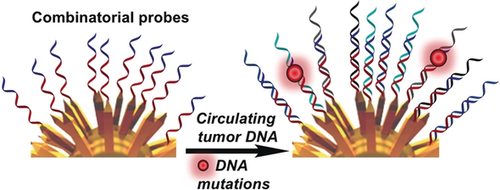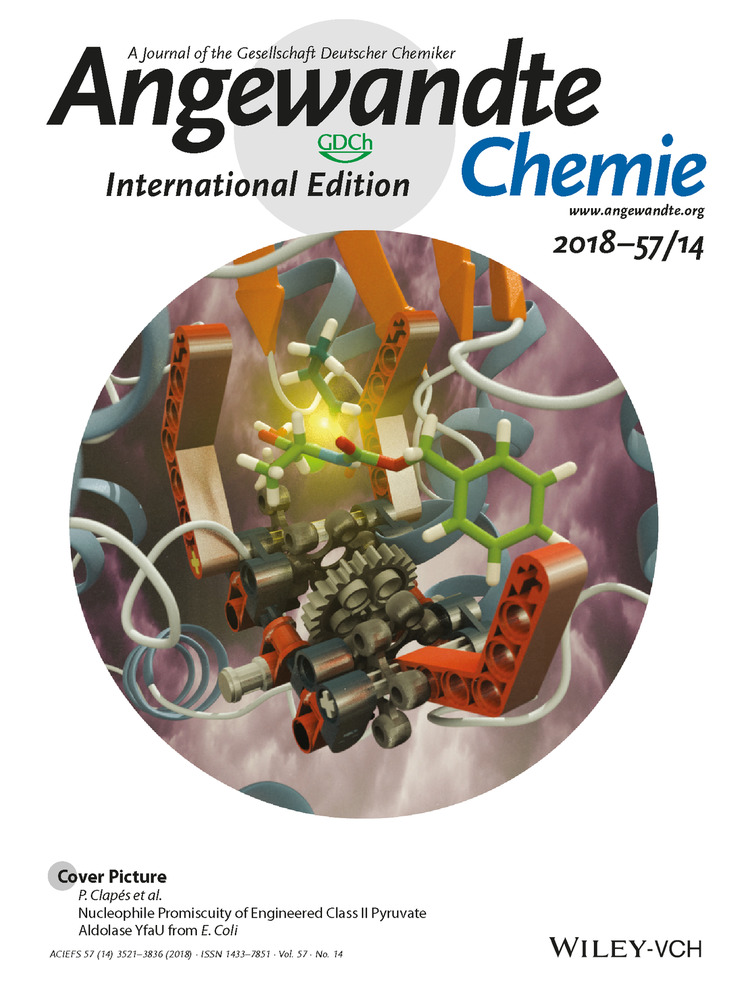Combinatorial Probes for High-Throughput Electrochemical Analysis of Circulating Nucleic Acids in Clinical Samples
Dr. Jagotamoy Das
Department of Pharmaceutical Sciences, Leslie Dan Faculty of Pharmacy, University of Toronto, Toronto, ON, M5S 3M2 Canada
Search for more papers by this authorDr. Ivaylo Ivanov
Department of Pharmaceutical Sciences, Leslie Dan Faculty of Pharmacy, University of Toronto, Toronto, ON, M5S 3M2 Canada
Search for more papers by this authorDr. Tina S. Safaei
Department of Electrical and Computer Engineering, Faculty of Engineering Department, University of Toronto, Toronto, ON, Canada
Search for more papers by this authorProf. Edward H. Sargent
Department of Electrical and Computer Engineering, Faculty of Engineering Department, University of Toronto, Toronto, ON, Canada
Search for more papers by this authorCorresponding Author
Prof. Shana O. Kelley
Department of Pharmaceutical Sciences, Leslie Dan Faculty of Pharmacy, University of Toronto, Toronto, ON, M5S 3M2 Canada
Search for more papers by this authorDr. Jagotamoy Das
Department of Pharmaceutical Sciences, Leslie Dan Faculty of Pharmacy, University of Toronto, Toronto, ON, M5S 3M2 Canada
Search for more papers by this authorDr. Ivaylo Ivanov
Department of Pharmaceutical Sciences, Leslie Dan Faculty of Pharmacy, University of Toronto, Toronto, ON, M5S 3M2 Canada
Search for more papers by this authorDr. Tina S. Safaei
Department of Electrical and Computer Engineering, Faculty of Engineering Department, University of Toronto, Toronto, ON, Canada
Search for more papers by this authorProf. Edward H. Sargent
Department of Electrical and Computer Engineering, Faculty of Engineering Department, University of Toronto, Toronto, ON, Canada
Search for more papers by this authorCorresponding Author
Prof. Shana O. Kelley
Department of Pharmaceutical Sciences, Leslie Dan Faculty of Pharmacy, University of Toronto, Toronto, ON, M5S 3M2 Canada
Search for more papers by this authorGraphical Abstract
Abstract
The analysis of circulating tumour nucleic acids (ctNAs) provides a minimally invasive way to assess the mutational spectrum of a tumour. However, effective and practical methods for analyzing this emerging class of markers are lacking. Analysis of ctNAs using a sensor-based approach has notable challenges, as it is vital to differentiate nucleic acids from normal cells from mutation-bearing sequences emerging from tumours. Moreover, many genes related to cancer have dozens of different mutations. Herein, we report an electrochemical approach that directly detects genes with mutations in patient serum by using combinatorial probes (CPs). The CPs enable detection of all of the mutant alleles derived from the same part of the gene. As a proof of concept, we analyze mutations of the EGFR gene, which has more than 40 clinically relevant alterations that include deletions, insertions, and point mutations. Our CP-based approach accurately detects mutant sequences directly in patient serum.
Supporting Information
As a service to our authors and readers, this journal provides supporting information supplied by the authors. Such materials are peer reviewed and may be re-organized for online delivery, but are not copy-edited or typeset. Technical support issues arising from supporting information (other than missing files) should be addressed to the authors.
| Filename | Description |
|---|---|
| anie201800455-sup-0001-misc_information.pdf568.9 KB | Supplementary |
Please note: The publisher is not responsible for the content or functionality of any supporting information supplied by the authors. Any queries (other than missing content) should be directed to the corresponding author for the article.
References
- 1
- 1aE. Yong, Nature 2017, 511, 524–526;
- 1bJ. C. M. Wan, C. Massie, J. Garcia-Corbacho, F. Mouliere, J. D. Brenton, C. Caldas, S. Pacey, R. Baird, N. Rosenfeld, Nat. Rev. Cancer 2017, 17, 223–238;
- 1cH. Schwarzenbach, D. S. B. Hoon, K. Pantel, Nat. Rev. Cancer 2013, 11, 426–437;
- 1dD. C. García-Olmo, C. Domínguez, M. García-Arranz, P. Anker, M. Stroun, J. M. García-Verdugo, D. García-Olmo, Cancer Res. 2010, 70, 560–567;
- 1eP. L. Bedard, A. R. Hansen, M. J. Ratain, L. L. Siu, Nature 2013, 501, 355–364;
- 1fC. Bettegowda, et al., Sci. Transl. Med. 2014, 6, 224ra24;
- 1gS. O. Kelley, Acc. Chem. Res. 2017, 50, 503–507.
- 2
- 2aJ. Kaiser, Science 2010, 327, 1072–1074;
- 2bA. Winther-Larsen, C. Demuth, J. Fledelius, A. T. Madsen, K. Hjorthaug, P. Meldgaard, B. S. Sorensen, Br. J. Cancer 2017, 117, 704–709;
- 2cS. Xu, F. Lou, Y. Wu, D.-Q. Sun, J.-B. Zhang, W. Chen, H. Ye, J.-H. Liu, S. Wei, M.-Y. Zhao, et al., Cancer Lett. 2016, 370, 324–331;
- 2dA. R. Thierry, F. Mouliere, S. El Messaoudi, C. Mollevi, E. Lopez-Crapez, F. Rolet, B. Gillet, C. Gongora, P. Dechelotte, B. Robert, et al., Nat. Med. 2014, 20, 430–435.
- 3
- 3aF. Diehl, et al., Nat. Med. 2008, 14, 985–990;
- 3bA. M. Newman, S. V. Bratman, J. To, J. F. Wynne, N. C. W. Eclov, L. A. Modlin, C. L. Liu, J. W. Neal, H. A. Wakelee, R. E. Merritt, et al., Nat. Med. 2014, 20, 548–554;
- 3cJ. Shendure, S. Balasubramanian, G. M. Church, W. Gilbert, J. Rogers, J. A. Schloss, R. H. Waterston, Nature 2017, 550, 345–353;
- 3dF. E. Dewey, S. Pan, M. T. Wheeler, S. R. Quake, E. A. Ashley, Circulation 2012, 125, 931–944.
- 4
- 4aJ. Li, L. Wang, H. Mamon, M. H. Kulke, R. Berbeco, G. M. Makrigiorgos, Nat. Med. 2008, 14, 579–584;
- 4bR. Lehmann-Werman, et al., Proc. Natl. Acad. Sci. USA 2016, 113, E 1826–E1834;
- 4cZ. Zuo, S. S. Chen, P. K. Chandra, J. M. Galbincea, M. Soape, S. Doan, B. A. Barkoh, H. Koeppen, L. J. Medeiros, R. Luthra, Mod. Pathol. 2009, 22, 1023–1031;
- 4dK. S. Thress, et al., Nat. Med. 2015, 21, 560–562;
- 4eM. Baker, Nat. Methods 2012, 9, 541–544;
- 4fX. Wang, et al., Am. J. Gastroenterol. 2011, 106, 2104–2111.
- 5
- 5aS. O. Kelley, C. A. Mirkin, D. R. Walt, R. F. Ismagilov, M. Toner, E. H. Sargent, Nat. Nanotechnol. 2014, 9, 969–980;
- 5bA. Gao, N. Lu, Y. Wang, P. Dai, T. Li, X. Gao, Y. Wang, C. Fan, Nano Lett. 2012, 12, 5262–5268.
- 6
- 6aA. T. Sage, J. D. Besant, B. Lam, E. H. Sargent, S. O. Kelley, Acc. Chem. Res. 2014, 47, 2417–2425;
- 6bM. Labib, E. H. Sargent, S. O. Kelley, Chem. Rev. 2016, 116, 9001–9090;
- 6cA. Furst, S. Landefeld, M. G. Hill, J. K. Barton, J. Am. Chem. Soc. 2013, 135, 19099–19102;
- 6dJ. D. Besant, J. Das, I. B. Burgess, W. Liu, E. H. Sargent, S. O. Kelley, Nat. Commun. 2015, 6, 6978.
- 7
- 7aJ. Das, K. B. Cederquist, A. A. Zaragoza, P. E. Lee, E. H. Sargent, S. O. Kelley, Nat. Chem. 2012, 4, 642–648;
- 7bJ. Das, M. A. Aziz, H. Yang, J. Am. Chem. Soc. 2006, 128, 16022–16023;
- 7cJ. D. Besant, J. Das, I. B. Burgess, W. Liu, E. H. Sargent, S. O. Kelley, Nat. Commun. 2015, 6, 6978;
- 7dJ. Das, S. O. Kelley, Anal. Chem. 2011, 83, 1167–1172;
- 7eE. Bakker, Y. Qin, Anal. Chem. 2006, 78, 3965–3983;
- 7fK. Chuah, L. M. H. Lai, I. Y. Goon, S. G. Parker, R. Amal, J. J. Gooding, Chem. Commun. 2012, 48, 3503–3505;
- 7gS. S. Mahshid, S. Camire, F. Ricci, A. Vallee-Belisle, J. Am. Chem. Soc. 2015, 137, 15596–15599;
- 7hH. Yang, A. Hui, G. Pampalakis, L. Soleymani, F.-F. Liu, E. H. Sargent, S. O. Kelley, Angew. Chem. Int. Ed. 2009, 48, 8461–8464; Angew. Chem. 2009, 121, 8613–8616;
- 7iY. Wan, Y.-G. Zhou, M. Poudineh, T. S. Safaei, R. M. Mohamadi, E. H. Sargent, S. O. Kelley, Angew. Chem. Int. Ed. 2014, 53, 13145–13149; Angew. Chem. 2014, 126, 13361–13365;
- 7jE. Vasilyeva, B. Lam, Z. Fang, M. D. Minden, E. H. Sargent, S. O. Kelley, Angew. Chem. Int. Ed. 2011, 50, 4137–4141; Angew. Chem. 2011, 123, 4223–4227;
- 7kY. Wu, R. Y. Lai, Chem. Commun. 2013, 49, 3422–3424;
- 7lM. A. McWilliams, R. Bhui, D. W. Taylor, J. D. Slinker, J. Am. Chem. Soc. 2015, 137, 11150–11155.
- 8
- 8aJ. Das, S. O. Kelley, Anal. Chem. 2013, 85, 7333–7338;
- 8bJ. D. Besant, J. Das, E. H. Sargent, S. O. Kelley, ACS Nano 2013, 7, 8183–8189;
- 8cB. Lam, J. Das, R. D. Holmes, L. Live, A. Sage, E. H. Sargent, S. O. Kelley, Nat. Commun. 2013, 4, 1–8;
- 8dK. Hsieh, A. S. Patterson, B. S. Ferguson, K. W. Plaxco, H. T. Soh, Angew. Chem. Int. Ed. 2012, 51, 4896–4900; Angew. Chem. 2012, 124, 4980–4984;
- 8eB. S. Ferguson, S. F. Buchsbaum, T.-T. Wu, K. Hsieh, Y. Xiao, R. Sun, H. T. Soh, J. Am. Chem. Soc. 2011, 133, 9129–9135.
- 9
- 9aJ. Das, I. Ivanov, L. Montermini, J. Rak, E. H. Sargent, S. O. Kelley, Nat. Chem. 2015, 7, 569–575;
- 9bJ. Das, I. Ivanov, E. H. Sargent, S. O. Kelley, J. Am. Chem. Soc. 2016, 138, 11009–11016.
- 10S. V. Sharma, D. W. Bell, J. Settleman, D. A. Haber, Nat. Rev. Cancer 2007, 7, 169–181.
- 11B. Lam, R. D. Holmes, J. Das, M. Poudineh, A. Sage, E. H. Sargent, S. O. Kelley, Lab Chip 2013, 13, 2569–2575.
- 12
- 12aL. Soleymani, Z. Fang, E. H. Sargent, S. O. Kelley, Nat. Nanotechnol. 2009, 4, 844–848;
- 12bX. Bin, E. H. Sargent, S. O. Kelley, Anal. Chem. 2010, 82, 5928–5931;
- 12cP. De Luna, S. S. Mahshid, J. Das, B. Luan, E. H. Sargent, S. O. Kelley, R. Zhou, Nano Lett. 2017, 17, 1289–1295.
- 13M. A. Lapierre, M. M. O'Keefe, B. J. Taft, S. O. Kelley, Anal. Chem. 2003, 75, 6327–6333.





